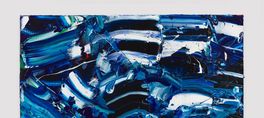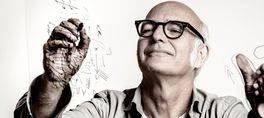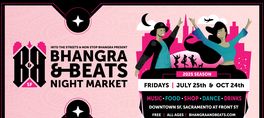Jesse Malin
Jesse Malin— whom the London Times says “writes vivid songs with killer tunes and sings them with scary conviction”— and Lucinda Williams— the southern troubadour once named “America’s best songwriter” by Time magazine— first met in the early 2000s at a jazz club in NYC’s West Village. In a joint 2017 Rolling Stone interview, the two discussed their “shared love of miscreants, misfits, the misunderstood and the mysteries of everyday lives binds them across the Mason-Dixon line.”
“From the early frontier days of hardcore in New York to all the punk rock and singer/songwriter touring,” says Malin, “it’s all been about survival and reinvention. I wanted to make an open-sounding record with the space to tell these stories. I like to write about characters and people I meet along the way. The dreamers, schemers, hustlers, romantics, lovers, leavers and believers.” Many of the dreamers, schemers and so on from Jesse’s own life contribute to Sunset Kids, his new album of highly personal songsbeing released August 30 on Wicked Cool Records.
Sunset Kids first took shape at The Hollywood Bowl, when Jesse accepted Lucinda’s invitation to see her open for what turned out to be Tom Petty and The Heartbreakers’ final concert.The bittersweet experience inspired one of the new album’s highlights, “Shining Down,” a rainy day jangle about “keeping alive the spirits of the ones we’ve lost.” During that same visit, the idea came about of three-time Grammy-winning Lucinda producing Jesse’s next record.
“Lucinda has a great eye for finding the beauty in broken things and a knack for always picking the right take. Once she started dancing in the control room, we knew we had it.”
In addition to this rare turn in the producer’s chair for Williams, she co-wrote and sang on the evocative Country-flavored “Room 13,” which Malin calls “the heart of the record in a lot of ways, about those meditative moments far away from home, where you’re forced to reflect on the things that really matter.”
The album also features “Chemical Heart,” an upbeat pop basher located at a mythical point on Queens Boulevard where Paul Simon and The Ramones intersect, name checking Bernie Taupin and Jake LaMotta among others. “Shane” is a gentle ballad about one of his heroes, the lovably shambolic Shane MacGowanof The Pogues.
“My first album, The Fine Art Of Self-Destruction, was about finding glory in the wreckage,” says Malin of the album which was upon release Uncut’s “Album of the Month.” “Sunset Kidsis about owning it. The failures, the victories, the moments. And moving up from there.”
After reflecting on his life while walking the streets of London, jamming riffs in an East Village basement and writing songs in Florida hotel rooms while visiting his ailing father, the ambitious 14-song album was recorded on both coasts between the two artists’ touring schedules.
It opens with the pre-apocalyptic confession “Meet Me At The End Of The World Again,” which includes backing vocals by Malin confidante and collaborator Joseph Arthur. Another key guest contribution comes courtesy of Green Day’s Billie Joe Armstrong, who co-wrote and sang on “Strangers & Thieves.”
“Billie Joe was in town and I showed him where we hung out when we were kids in the hardcore days,” Malin recalls. “A couple days later, I got a text and he had finished the song. He went into the details of his experience in the Bay Area with that scene, and also my experiences, which were very parallel in New York.”
Those early days found a young Jesse “riding the subway trains from Queens to the record stores and nightclubs in dirty, pre-Disney New York City” and never looking back. His band Heart Attack put out the first New York hardcore single “God Is Dead” when Malin was 14 years old. He later went on to acclaim as the frontman for the fast and loud D Generation, whose albums were produced by Ric Ocasek, Tony Visconti and David Bianco.
Bianco is one of the Sunset Kids referenced in the album’s title. The engineer who won a Grammy for his pristine sonics on Tom Petty’s Wildflowers and produced the first major-label release of Jesse’s career passed away suddenly after overseeing the initial sessions for Sunset Kids in his L.A. studio.
“Playing music is something I need to do. Singing under those hot lights every night is a great exorcism. We get to put together this pirate ship of characters and go around the world making trouble and singing our guts out.”
As the line in crucial cut “When You’re Young” says, “Don’t waste your life on things that don’t get better.” Malin concludes: “It’s about finding ways to survive and navigate through all this stuff. Being compassionate and loving in a world that will break your heart. But you’re still here. You wake up again and put one foot in front of the other and live every day like it could be your last.”
Joseph Arthur
The interesting parts of our stories aren’t the famous people we meet…
Or the times when everything is basically working. Or when we get to lay in comfort with a partner watching Netflix and the world go by.
The interesting parts are when all those things break down and you’re left in isolation to finally deal with the roots of whatever had been thwarting your existence all along. The interesting parts are when the world has turned its back on you and you have turned your back on it or them. When darkness could seemingly swallow you whole if it hasn’t already. When there is no such thing as hope and so you manufacture it from a dream which only angle is to survive.
If all this sounds dramatic then you haven’t been there yet. If it doesn’t then you know that this is actually an understatement. The interesting parts of our stories are when they seem like the final chapter has been read and the book thrown in the fire. The interesting parts of our stories are written with the smoke of our burnt out lives.
Come Back World is an album about rebirth and survival. At least that’s what it means to me. The title track I wrote in a little town on my way to aspen on a tour celebrating the 15th anniversary of Redemption’s Son. I was alone touring in a rented car driving myself across the country as a support act and doing what I could to rebuild my career. New management, eviction notices, an injured shoulder and most importantly estrangement from my family of origin. Discovering newly that my life and my soul had been ravaged for the most part covert forms of emotional abuse know. Commonly as NPD. The discovery of which is commonly followed by extreme isolation, PTSD, and the realization that nearly everything in your life needs to be built again.
I realize this is an intense way to start a bio about a new album but there really is no other way to paint the story of how this album came to be if I want it to be anything resembling the truth.
Because for me this album is all about surviving that predicament which for those unfamiliar with it will perhaps sound like madness (which it is ironically designed too) and for those that know about it and those that have survived it, will know that one can do little else but focus on the rebuilding, the bringing back of your world.
Herman Hesse said the best art comes from necessity and this art certainly qualifies. I had nothing but songs to get me out of the hole I was in.
The songs themselves aren’t all literal interpretations of what I was going through but the strength of them comes from the fact that I needed them to be good enough to deliver some kind of life back too me. A life I had lost that wasn’t gonna get found. But perhaps a new life could be built. A better one. One that wasn’t rooted in lies. – JA
Jesse Malin
Jesse Malin— whom the London Times says “writes vivid songs with killer tunes and sings them with scary conviction”— and Lucinda Williams— the southern troubadour once named “America’s best songwriter” by Time magazine— first met in the early 2000s at a jazz club in NYC’s West Village. In a joint 2017 Rolling Stone interview, the two discussed their “shared love of miscreants, misfits, the misunderstood and the mysteries of everyday lives binds them across the Mason-Dixon line.”
“From the early frontier days of hardcore in New York to all the punk rock and singer/songwriter touring,” says Malin, “it’s all been about survival and reinvention. I wanted to make an open-sounding record with the space to tell these stories. I like to write about characters and people I meet along the way. The dreamers, schemers, hustlers, romantics, lovers, leavers and believers.” Many of the dreamers, schemers and so on from Jesse’s own life contribute to Sunset Kids, his new album of highly personal songsbeing released August 30 on Wicked Cool Records.
Sunset Kids first took shape at The Hollywood Bowl, when Jesse accepted Lucinda’s invitation to see her open for what turned out to be Tom Petty and The Heartbreakers’ final concert.The bittersweet experience inspired one of the new album’s highlights, “Shining Down,” a rainy day jangle about “keeping alive the spirits of the ones we’ve lost.” During that same visit, the idea came about of three-time Grammy-winning Lucinda producing Jesse’s next record.
“Lucinda has a great eye for finding the beauty in broken things and a knack for always picking the right take. Once she started dancing in the control room, we knew we had it.”
In addition to this rare turn in the producer’s chair for Williams, she co-wrote and sang on the evocative Country-flavored “Room 13,” which Malin calls “the heart of the record in a lot of ways, about those meditative moments far away from home, where you’re forced to reflect on the things that really matter.”
The album also features “Chemical Heart,” an upbeat pop basher located at a mythical point on Queens Boulevard where Paul Simon and The Ramones intersect, name checking Bernie Taupin and Jake LaMotta among others. “Shane” is a gentle ballad about one of his heroes, the lovably shambolic Shane MacGowanof The Pogues.
“My first album, The Fine Art Of Self-Destruction, was about finding glory in the wreckage,” says Malin of the album which was upon release Uncut’s “Album of the Month.” “Sunset Kidsis about owning it. The failures, the victories, the moments. And moving up from there.”
After reflecting on his life while walking the streets of London, jamming riffs in an East Village basement and writing songs in Florida hotel rooms while visiting his ailing father, the ambitious 14-song album was recorded on both coasts between the two artists’ touring schedules.
It opens with the pre-apocalyptic confession “Meet Me At The End Of The World Again,” which includes backing vocals by Malin confidante and collaborator Joseph Arthur. Another key guest contribution comes courtesy of Green Day’s Billie Joe Armstrong, who co-wrote and sang on “Strangers & Thieves.”
“Billie Joe was in town and I showed him where we hung out when we were kids in the hardcore days,” Malin recalls. “A couple days later, I got a text and he had finished the song. He went into the details of his experience in the Bay Area with that scene, and also my experiences, which were very parallel in New York.”
Those early days found a young Jesse “riding the subway trains from Queens to the record stores and nightclubs in dirty, pre-Disney New York City” and never looking back. His band Heart Attack put out the first New York hardcore single “God Is Dead” when Malin was 14 years old. He later went on to acclaim as the frontman for the fast and loud D Generation, whose albums were produced by Ric Ocasek, Tony Visconti and David Bianco.
Bianco is one of the Sunset Kids referenced in the album’s title. The engineer who won a Grammy for his pristine sonics on Tom Petty’s Wildflowers and produced the first major-label release of Jesse’s career passed away suddenly after overseeing the initial sessions for Sunset Kids in his L.A. studio.
“Playing music is something I need to do. Singing under those hot lights every night is a great exorcism. We get to put together this pirate ship of characters and go around the world making trouble and singing our guts out.”
As the line in crucial cut “When You’re Young” says, “Don’t waste your life on things that don’t get better.” Malin concludes: “It’s about finding ways to survive and navigate through all this stuff. Being compassionate and loving in a world that will break your heart. But you’re still here. You wake up again and put one foot in front of the other and live every day like it could be your last.”
Joseph Arthur
The interesting parts of our stories aren’t the famous people we meet…
Or the times when everything is basically working. Or when we get to lay in comfort with a partner watching Netflix and the world go by.
The interesting parts are when all those things break down and you’re left in isolation to finally deal with the roots of whatever had been thwarting your existence all along. The interesting parts are when the world has turned its back on you and you have turned your back on it or them. When darkness could seemingly swallow you whole if it hasn’t already. When there is no such thing as hope and so you manufacture it from a dream which only angle is to survive.
If all this sounds dramatic then you haven’t been there yet. If it doesn’t then you know that this is actually an understatement. The interesting parts of our stories are when they seem like the final chapter has been read and the book thrown in the fire. The interesting parts of our stories are written with the smoke of our burnt out lives.
Come Back World is an album about rebirth and survival. At least that’s what it means to me. The title track I wrote in a little town on my way to aspen on a tour celebrating the 15th anniversary of Redemption’s Son. I was alone touring in a rented car driving myself across the country as a support act and doing what I could to rebuild my career. New management, eviction notices, an injured shoulder and most importantly estrangement from my family of origin. Discovering newly that my life and my soul had been ravaged for the most part covert forms of emotional abuse know. Commonly as NPD. The discovery of which is commonly followed by extreme isolation, PTSD, and the realization that nearly everything in your life needs to be built again.
I realize this is an intense way to start a bio about a new album but there really is no other way to paint the story of how this album came to be if I want it to be anything resembling the truth.
Because for me this album is all about surviving that predicament which for those unfamiliar with it will perhaps sound like madness (which it is ironically designed too) and for those that know about it and those that have survived it, will know that one can do little else but focus on the rebuilding, the bringing back of your world.
Herman Hesse said the best art comes from necessity and this art certainly qualifies. I had nothing but songs to get me out of the hole I was in.
The songs themselves aren’t all literal interpretations of what I was going through but the strength of them comes from the fact that I needed them to be good enough to deliver some kind of life back too me. A life I had lost that wasn’t gonna get found. But perhaps a new life could be built. A better one. One that wasn’t rooted in lies. – JA
show less









